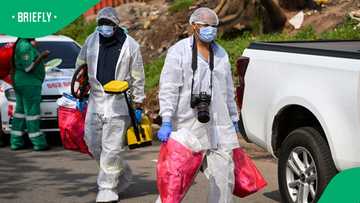Government Defends Removing Informal Traders in Johannesburg
- The city of Johannesburg has argued that its removal of informal traders was within the boundaries of the City's bylaws
- The City had removed informal traders as part of its efforts to clean the city in preparation for the G20 Summit to be held in South Africa
- The City responded to the court case that the Socio-Economic Rights Institute (SERI) opened agaisnt it for the removals
Tebogo Mokwena, Briefly News’ Deputy Head of Current Affairs, contributed coverage of international and local social issues, including health, corruption, education, unemployment, labour, service delivery protests, and immigration in South Africa, during his seven years at Daily Sun and Vutivi Business News.

Source: Getty Images
JOHANNESBURG — The City of Johannesburg has spoken up about the court case the Socioeconomic Research Institute (SERI) is pursuing against it for removing informal traders in the city.
According to eNCA, hundreds of people protested in Johannesburg outside the Gauteng High Court. Protesters were on the side of the city of Johannesburg for removing the informal trades. Others, including Operation Dudula, the Economic Freedom Fighters, and March and March, marched in support of the informal traders who were removed.
Mayor defends removal of traders
Morero said that the removals were in line with the bylaws. He said that the case is likely to be postponed because the judge has allowed both parties to negotiate for a settlement. He said the City is supporting informal settlements. He said both parties agree that the city's streets must also be clean.
Morero said that the city will assist informal traders in registering. He added that undocumented foreign nationals were not allowed to trade. He said that informal traders had closed the whole street, and traffic on the ordinary streets was impeded. He said South Africans eligible to trade were not removed. He said informal traders have also been issued licenses to permit them to trade. He said citizens do not have the right to sublet their licenses or give them to foreign nationals.
Source: Briefly News


